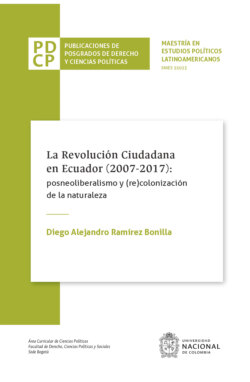Читать книгу La revolución ciudadana en Ecuador (2007-2017): posneoliberalismo y (re)colonización de la naturaleza - Diego Alejandro Ramírez Bonilla - Страница 8
На сайте Литреса книга снята с продажи.
ОглавлениеAbstract
This work analyzes the dynamics of coloniality of nature deployed by the Citizen Revolution, with emphasis on the Yasuní ITT, during the Rafael Correa administration (2007-2017). It elucidates the role of the Citizen Revolution in the insertion of Ecuador in the neoliberal phase of the global pattern of power, to explain the way it represented nature and to clarify the dynamics of intensive extraction of natural goods deployed in the ITT. The Citizen Revolution is understood as a post-neoliberal project that guarantees the subordination of Ecuador to the global pattern of power in its neoliberal phase, reproduces the colonial discourse of development that favors the representation of nature as a subaltern space that can be depredated, and deepens the practices of intensive extraction of natural goods for the benefit of transnational capital –especially that of Chinese origin. This research is based on a theoretical exchange between the modernity/coloniality research program, Latin American political ecology and ecological Marxism, taking the periphery as the place of enunciation. The qualitative analysis employed draws from primary and secondary sources, among which are official documents, portals of geographic information, scientific research, journalistic reports and articles, among others. It is concluded that the Citizen Revolution is a post-neoliberal project that reproduces the neoliberal dynamics of coloniality of nature, under a supposedly counter-hegemonic discourse, for the benefit of hegemonic actors worldwide, particularly China.
Keywords: Ecuador, Citizen’s Revolution, coloniality of nature, postneoliberalism, development, Good Living.
